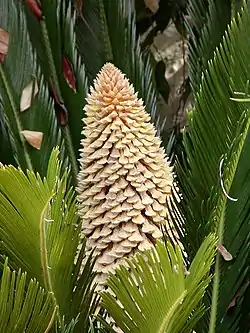Cycas
Cycas is a genus of plants. It is the only living genus remaining in the Cycadaceae family. Cycads were common plants when dinosaurs roamed the Earth, but are rare today.
| Cycas | |
|---|---|
 | |
| Leaves and male cone of Cycas revoluta | |
| Scientific classification | |
| Kingdom: | |
| Division: | |
| Class: | |
| Order: | |
| Family: | Cycadaceae Persoon |
| Genus: | Cycas |

Over 100 species are known. Probably the best-known of these is Cycas revoluta, the Sago Palm. The generic name comes from Greek kykas and means "palm tree". The plant is not a true palm, however.
Cycas is native to the Old World; most species are around the equatorial regions. It is native to eastern and southeastern Asia including the Philippines with 6 species (4 of which are endemic), eastern Africa (including Madagascar), northern Australia, Polynesia, and Micronesia. Australia has 26 species, while the Indo-Chinese area has about 30. The northernmost species (C. revoluta) is found at 31°N in southern Japan. The southernmost (C. megacarpa) is found at 26°S in southeast Queensland, Australia.
The plants have often been considered to be a living fossil. The earliest fossils of the genus Cycas appear in the Cainozoic, but Cycas-like fossils occur well into the Mesozoic. Phylogenetic studies have shown that Cycadaceae is the sister-group to all other living cycads.
Other websites
- Cycad Pages: Cycas Archived 2020-11-06 at the Wayback Machine
- Singh R. & Radha P. 2006. Cycas annaikalensis, a new species of Cycas from the Malabar Coast, Western Ghats, India. Brittonia 58 (2): 119-123.